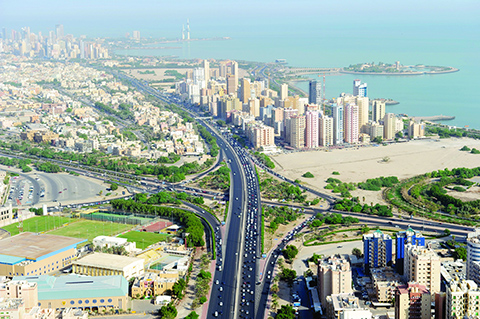 KUWAIT: While rents registered some drop in northern and southern areas, they remain mostly unaltered the closer the property is to Kuwait City. - KUNA photo
KUWAIT: While rents registered some drop in northern and southern areas, they remain mostly unaltered the closer the property is to Kuwait City. - KUNA photoKUWAIT: 'Everything has become expensive.' 'Prices go up regularly, while salaries are the same.' These are common complaints of people in Kuwait - especially expatriates, as they are the most affected by poor and stagnant salaries. Housing is one of the main issues related to the cost of living, as it consumes the greatest part of the monthly budget. Rent values rose significantly during the 10 years from 2006 to 2016; when the rents finally started to drop.
But rent rates differ according to the area. According to Ahmad, a real estate broker, rent values dropped significantly only in far-flung areas. "In commercial areas, rent dropped slightly or even remained the same, as most landlords refuse to lower the rent. I know an owner who has three buildings that are mostly vacant, as he refuses to decrease the rent, even as tenants left his apartments for cheaper ones. But I know that in southern and northern areas, rent dropped in greater percentages," he told Kuwait Times.
Lower value
Meshaal Al-Qaseem, owner of Kazma Real Estate in Jahra, confirmed that rent values dropped in Jahra governorate by up to 40 percent compared to last year. "We were renting a two-bedroom apartment in Jahra for KD 250 only last year, while the same apartment is now being offered for KD 150 or 170. Tenants are now aware of the rent values and demand a decrease in rent, otherwise they will move to a cheaper apartment. The same trend has been seen in Sulaibikhat, Doha, Ardiya, Jaber Al-Ahmad and Farwaniya," he explained.
Various reasons are behind the fall in rent values. "Rent started to drop last year, but more so this year. Real estate prices have fallen, but landlords do not want to admit this. A government house in West Sulaibikhat used to command a rent of KD 1,000, but today it is hard to find a tenant for KD 700. Many new rules were issued against expats, so they left or will be leaving - such as terminating hundreds of expat teachers and new rules to terminate expat employees from the public sector," added Qaseem.
Lower inflation
Economist Fahd Al-Saqer noted that inflation this year is lower than last year - between 2 to 2.5 percent. "Inflation in Kuwait increased by about 10 to 12 percent in the past 10 years, which is acceptable in this region where inflation rates are higher than Kuwait. We are a consumerist country dependent on imported goods, so any price hike in other countries will affect us. Also, the Kuwaiti dinar is linked to the US dollar and fluctuations in the international markets, in addition to the price of oil, so what happens there affects us," he pointed out.
According to Trading Economics.com, Kuwait's inflation rate is the lowest since Aug 2004. Consumer prices in Kuwait increased 1.3 percent year-on-year in July 2017. It is the lowest inflation rate since Aug 2004, due to a fall in cost of housing services (-2.3 percent) and communication (-1.1 percent), mainly due to lower Internet charges.
In addition, inflation slowed for food and beverages (0.3 percent), clothing and footwear (2.1 percent) and transport (15.5 percent). On the other hand, prices of furnishing and maintenance rose (3.4 percent). On a monthly basis, consumer prices edged down 0.1 percent. The inflation rate in Kuwait averaged 3.03 percent from 1995 until 2017, reaching an all-time high of 11.70 percent in Aug 2008 and a record low of -1.15 percent in April 1998.
No signs
According to Saqer, inflation this year fell due to the drop in real estate prices. "Real estate prices are still decreasing and there are no signs of any price hikes. The price differs according to the area - for instance in Jahra, it is around 30 percent due to the new houses given by the government to Kuwaitis in Abdaly, which is about a 10-minute drive from there. Prices have fallen by only 10-15 percent in commercial areas such as Hawally or Salmiya, as demand is still relatively high in these areas," stressed Saqer.
"Also, the government has played a role in this matter. This year it distributed around 12,500 government houses to citizens, while the figure in the past was between 1,000 to 2,000 annually. This affected the occupancy of rental apartments. The current geopolitical situation in the region has also discouraged investors to invest in Kuwait, and most Kuwaiti investors prefer to invest abroad. For instance, the Nugra Complex was offered for sale in a bid three times, but it was not sold although it has an excellent location and good income," he said.
Regarding consumer goods, prices have definitely hiked, but there are no official statistics of the exact percentage. But consumers feel the pinch when going grocery shopping these days, compared to a couple of years ago. Saqer noted that last year's hike in petrol prices had a great impact on many local goods and services.
By Nawara Fattahova, Staff Writer










